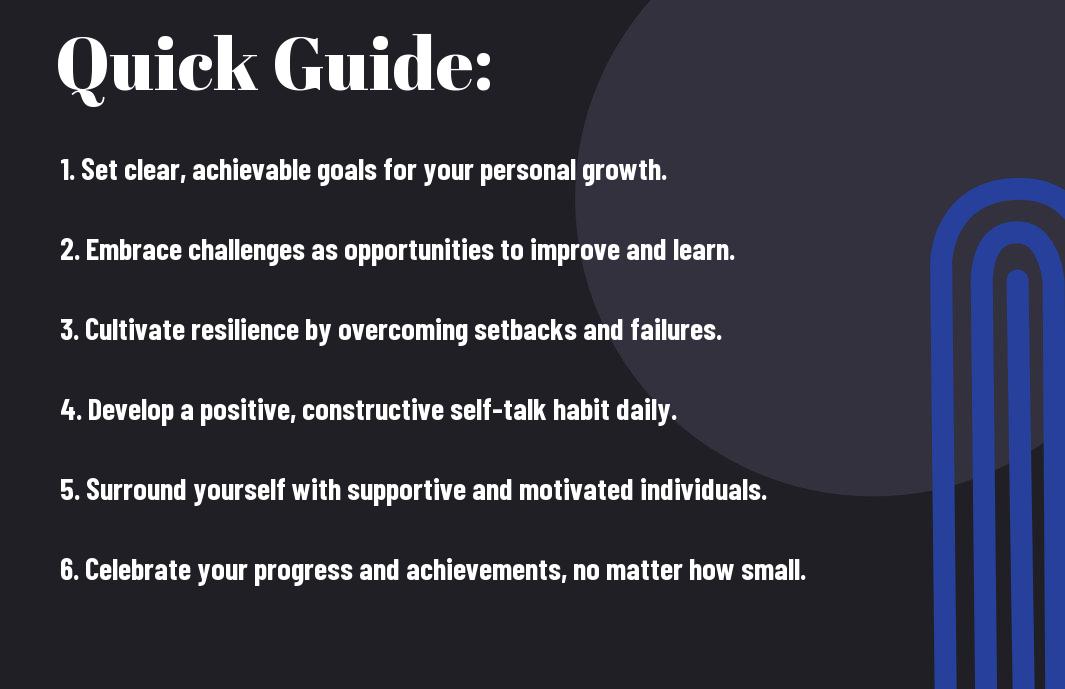Guide yourself toward a more fulfilling and successful life by developing an achievement mindset. In this comprehensive guide, you’ll learn practical strategies to cultivate resilience, embrace challenges, and set realistic goals. By fostering this mindset, you will not only boost your performance but also enhance your overall well-being. Whether you’re navigating personal or professional obstacles, this guide will equip you with the tools you need to unlock your full potential and achieve your aspirations.

Key Takeaways:
- Growth Mindset: Emphasize the belief that abilities can be developed through dedication and hard work.
- Resilience: Cultivate the ability to bounce back from setbacks and challenges, viewing them as opportunities for growth.
- Goal Setting: Encourage clear, measurable, and achievable goals to provide direction and motivation.
- Positive Self-Talk: Foster the use of affirmations and constructive internal dialogue to boost confidence and performance.
- Feedback Utilization: Teach the importance of seeking and applying feedback to improve skills and outcomes.
- Curiosity: Promote an inquisitive nature that drives exploration and learning, paving the way for innovation.
- Collaboration: Highlight the value of teamwork and learning from others to enhance personal and collective growth.
Types of Achievement Mindsets
While understanding the types of achievement mindsets can empower your personal growth, it’s important to recognize how they influence your behavior and success. Here are the key types to consider:
- Growth Mindset
- Fixed Mindset
- Achievement Mindset
- Performance Mindset
- Learning Mindset
After recognizing these mindsets, you can tailor your approach to achieving goals and enhancing your potential.
| Type of Mindset | Description |
|---|---|
| Growth Mindset | Belief in the ability to develop skills through effort and persistence. |
| Fixed Mindset | Belief that abilities are static and cannot be changed. |
| Achievement Mindset | Focus on achieving goals and thriving in challenges. |
| Performance Mindset | Emphasis on outcomes rather than the process of learning. |
| Learning Mindset | Value placed on learning and growth over simply proving intelligence. |
Growth Mindset
The growth mindset is the belief that through determination and effort, you can enhance your skills and abilities. This mindset encourages you to embrace challenges and view failures as opportunities to learn and grow. By adopting a growth mindset, you position yourself for continuous improvement and success.
Fixed Mindset
Assuming a fixed mindset means you believe that your abilities, intelligence, and talents are inherent traits that cannot be changed. This viewpoint can limit your potential, often making you avoid challenges, give up easily, or feel threatened by others’ success.
Growth in a fixed mindset can often feel stunted, as you may shy away from taking risks or exploring new opportunities. This can lead to a lack of motivation and stagnation in personal and professional development. Instead, shifting towards a growth mindset can open doors to new possibilities and achievements, encouraging you to step outside your comfort zone.

Key Factors Influencing Achievement Mindset
You can cultivate an achievement mindset by focusing on several key factors that shape your approach to challenges and success:
- Your environment
- Your personal beliefs
- Your support system
- Your experiences
Any shift in these areas can significantly affect your mindset. For more insights, check out Building a Mindset for Success – Ripen.
Environment
Mindset is heavily influenced by your environment. Surrounding yourself with positivity fosters a conducive atmosphere for growth. Engaging spaces and supportive relationships enable you to embrace challenges rather than shy away from them.
Personal Beliefs
If you hold limiting beliefs about your abilities, you may inadvertently sabotage your potential for achievement. Your view of yourself plays a significant role in determining your success.
To build a robust achievement mindset, challenge any self-defeating beliefs you hold. Replace negative thoughts with affirmations that reinforce your capabilities. Acknowledge that mistakes are part of the learning process and strengthen your resolve to keep progressing. Your beliefs can serve as powerful tools in shaping your journey to success.
Step-by-Step Guide to Developing an Achievement Mindset
Keep your focus on actionable steps to develop an achievement mindset. This guide will help you break down the necessary components.
| Step | Description |
| 1. Self-Assessment | Evaluate your current mindset and identify areas for improvement. |
| 2. Goal Setting | Establish clear, measurable, and achievable goals. |
| 3. Continuous Learning | Commit to lifelong learning and skill development. |
| 4. Positive Environment | Surround yourself with supportive people and resources. |
Self-Assessment
SelfAssessment is your first step toward an achievement mindset. Take the time to critically evaluate your beliefs, habits, and behaviors. This reflection allows you to identify limiting thoughts and patterns that may hinder your progress. Understanding your starting point will give you a clearer vision of what needs to change in order to set you on the right path.
Goal Setting
Little adjustments in your goal-setting approach can lead to significant changes in your mindset. By establishing achievable, measurable goals, you can create a roadmap that guides your actions and decisions. This sense of direction fuels your motivation and commitment to personal growth.
Setting specific goals not only helps you maintain focus but also allows for tracking your progress. Break down larger objectives into manageable steps, ensuring each goal is time-bound. This structure provides a sense of urgency and accountability, driving you to move forward. Regularly evaluate and adjust your goals as necessary, fostering a dynamic environment that promotes continuous achievement.

Tips for Fostering an Achievement Mindset
Many individuals seek ways to cultivate an achievement mindset. Here are some practical tips to help you on this journey:
- Set specific, achievable goals.
- Surround yourself with like-minded individuals.
- Celebrate your small wins.
- Stay persistent and resilient in the face of obstacles.
- Be open to feedback and self-reflection.
Any effort you make towards these tips will contribute to developing a strong achievement mindset.
Embrace Challenges
Any challenge you face presents an opportunity for growth. Tackling difficult tasks not only hones your skills but also fosters resilience. When you approach challenges with a positive mindset, you’re more likely to learn and adapt, ultimately fueling your progress.
Learn from Failure
Embrace setbacks as valuable lessons rather than insurmountable obstacles. Each failure offers insights that can guide your future efforts. Adopting a mindset that views failure as a stepping stone toward success allows you to persist and improve continuously.
A willingness to analyze your failures and extract lessons from them is fundamental to achieving your goals. When you reflect on what went wrong, you’ll identify patterns and areas for improvement. This proactive approach enables you to redefine your strategies, making you better equipped to tackle future challenges with increased confidence and insight.
Pros and Cons of Different Achievement Mindsets
Once again, understanding the pros and cons of various achievement mindsets can help you determine which mindset supports your goals more effectively. Below is a comparison of the most prevalent mindsets:
| Mindset | Pros |
|---|---|
| Growth Mindset | Encourages resilience and continuous learning. |
| Fixed Mindset | Can lead to stability and a clear sense of identity. |
| Achievement Mindset | Focuses on reaching goals and celebrating success. |
| Performance Mindset | Aliqa at avoiding errors enhances performance under pressure. |
| Learning Mindset | Promotes knowledge acquisition over mere achievement. |
| Adaptive Mindset | Allows flexible responses to changing obstacles. |
| Resilient Mindset | Fosters perseverance in the face of challenges. |
| Creative Mindset | Encourages innovative solutions and approaches. |
| Collaborative Mindset | Emphasizes teamwork and shared success. |
| Outcome-Oriented Mindset | Keeps your focus on results and achievements. |
For a deeper understanding, check out Growth Mindset | A Guide to Celebrating Achievements.
Benefits of a Growth Mindset
Now, embracing a growth mindset can transform your approach to challenges. You start viewing setbacks as opportunities for growth and development, enhancing your ability to learn and adapt. This mindset fosters resilience, inspiring you to pursue continuous self-improvement and passion-driven achievements without fearing failure.
Limitations of a Fixed Mindset
With a fixed mindset, you tend to see your abilities as static, leading to a fear of failure and avoidance of challenges. This mindset can limit your potential and stifle personal growth, as you may not seek out new experiences or learn from your mistakes.
Mindset plays a significant role in how you approach learning and success. When you subscribe to a fixed mindset, you might believe that talent alone is the determining factor in success. This belief can cause you to shy away from taking risks or trying new skills, resulting in missed opportunities for growth. Adopting a more flexible mindset could enhance your resilience and willingness to learn, ultimately enriching your personal and professional life.

Common Mistakes to Avoid
Now that you understand the importance of cultivating an achievement mindset, it’s important to be aware of common mistakes that can hinder your progress. Identifying and correcting these pitfalls will help keep you on track and maintain a focused approach to your goals. By actively avoiding these missteps, you can enhance your performance and stay committed to your journey of growth.
Underestimating Effort
One of the biggest misjudgments you can make is underestimating the effort required to achieve your goals. Success often demands dedication and persistence, so it’s vital to acknowledge that hard work is a fundamental part of the process.
Ignoring Feedback
One mistake that many individuals make is ignoring feedback from others. Constructive criticism is a valuable tool that can help you improve and develop your skills, but failing to acknowledge it can stall your progress.
Understanding the significance of feedback allows you to gain insights into your performance and identify areas for improvement. When you receive feedback, it’s an opportunity to learn and adjust your approach. Instead of dismissing it, embrace the perspectives offered by others; they can provide you with a clearer picture of your strengths and weaknesses. By actively seeking and incorporating feedback, you create a pathway for continuous growth and success in your pursuits.
To wrap up
Taking this into account, the Building Achievement Mindset Guide is designed to empower you in your journey towards personal growth and success. By adopting the principles outlined in this guide, you can cultivate resilience, embrace challenges, and foster a strong belief in your abilities. This mindset shift will not only enhance your performance but also lead to a more fulfilling and purpose-driven life. Embrace these strategies, and watch as you unlock your full potential.
FAQ
Q: What is the ‘Building Achievement Mindset Guide’?
A: The ‘Building Achievement Mindset Guide’ is a comprehensive resource designed to help individuals cultivate an achievement-oriented mindset. It covers strategies, techniques, and exercises for developing resilience, setting goals, and enhancing motivation to achieve personal and professional success.
Q: Who can benefit from this guide?
A: This guide is beneficial for anyone looking to improve their mindset towards achieving their goals, including students, professionals, and individuals seeking personal development. It is particularly useful for those facing challenges in reaching their aspirations or feeling stuck in their current situations.
Q: What are some key concepts covered in the guide?
A: The guide explores several vital concepts such as goal-setting techniques, the importance of a growth mindset, strategies for overcoming limiting beliefs, and methods for boosting motivation and perseverance. It also includes insights on how to create a positive environment conducive to achievement.
Q: How is the guide structured?
A: The guide is structured into several sections, each focusing on different aspects of the achievement mindset. It includes theoretical explanations, practical exercises, and real-life examples to help readers apply the concepts effectively. Additionally, there are reflection prompts to encourage personal insights and growth.
Q: Are there activities included in the guide?
A: Yes, the guide features a variety of activities and exercises aimed at reinforcing the concepts presented. These activities encourage self-reflection, goal clarification, and the development of actionable plans to foster an achievement mindset. They are designed to be engaging and applicable to everyday life.
Q: How can I apply the principles from the guide in my daily life?
A: You can apply the principles by starting with small, actionable steps. Set specific goals for yourself, identify potential obstacles, and develop strategies to overcome them. Incorporating daily affirmations, tracking your progress, and seeking accountability from others can also enhance your application of the guide’s teachings.
Q: Is there any support available for readers of the guide?
A: Many editions of the guide offer additional resources such as online forums, workshops, or coaching sessions to support readers. Engaging with a community of like-minded individuals can also provide motivation and accountability as you work on building your achievement mindset.




